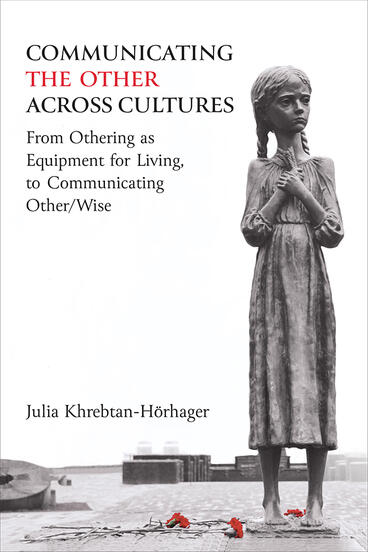Communicating the Other across Cultures
From Othering as Equipment for Living, to Communicating Other/Wise
Exposes how we have constructed and marginalized the Other across cultures, and suggests creative global solutions for inclusive multiculturalism
Description
Whenever political and social decisions use categories of identity such as race, religion, social class, or nationality to distinguish groups of people, they risk holding certain groups as inferior and culturally “Other.” When people employ ideologies of imperialism, colonialism, patriarchy, and classism, they position certain groups as superior or ideal/ized people. Such ideological positioning causes nations to take actions that isolate or endanger minoritized populations. This cultural Othering can lead to atrocities such as Native Americans being expelled from their native lands through the Trail of Tears, millions of Ukrainians starving to death during the Holodomor, or millions of Jews exterminated during the Holocaust.
Communicating the Other across Cultures uses examples from the United States, Western Europe, and Russia to demonstrate historical patterns of Othering people, as well as how marginalized people fight back against dominant powers that seek to silence or erase them. Deeply ingrained in our society, cultural Othering affects information in history books, children’s education, and the values upheld in our society. By taking a closer look at historical and modern instances of Othering, Julia Khrebtan-Hörhager shows examples of how different societies created ideas of social and cultural superiority or inferiority, and how deeply they are ingrained in our current society. In everyday life—the cash in your pocket, the movies shown at your local theater, museum exhibits, or politician's speeches—certain cultural ideologies are consistently upheld, while others are silenced. By exposing the communicative patterns of those in power, Khrebtan-Hörhager then suggests alternative ways of thinking, communicating, and eventually being, that offer transformative solutions for global problems.
Julia Khrebtan-Hörhager is an Associate Professor of Communication Studies and a Director of Education Abroad Programs in Italy at Colorado State University, a Director of the ACT International Human Rights Film Festival, and a Global Scholar at the Institute for Shipboard Education/Semester at Sea.
Reviews
“This book provides a comprehensive interdisciplinary analysis of cultural othering as a discursive, rhetorical, and material process. Julia Khrebtan-Hörhager astutely integrates cross-continental histories of othering, oppression, and resistance to illuminate othering as a complex assemblage that guides how we live with each other.”
- Marina Levina, The University of Memphis
“This book is a timely reminder that othering, while persistent, has never been the only way people approach those who are different from them.”
- Jolanta Drzewiecka, Università della Svizzera italiana
“Julia Khrebtan-Hörhager’s brilliant book offers readers a concise and provocative definition of cultural Othering—a practice of politically empowered elites to discursively, visually, and materially divide humanity into a group of those with access to the freedoms of liberal, Western modernity and those on whose backs that world has been built. Her examination of cultural Othering is elegant and pointed, pulling from cases across vast geopolitical and historical events to elucidate the harms of Othering and to acknowledge the importance in disentangling ourselves from the Self/Other regime.”
- Michael Lechuga, Author of Visions of Invasion: Alien Affects, Cinema, and Citizenship in Settler Colonies
“A beautifully written and deeply textured exploration of the multiple meanings of ‘Othering.’ Khrebtan-Hörhager leads the reader to reflect upon an array of textual and visual examples of depictions of Others, driving home the argument that this is a universal and ongoing challenge.”
- Todd Sandel, The University of Macau
"An intellectually stimulating, rigorously analyzed, and historically extremely well-informed study of the phenomenon of Othering worldwide. It engages a wide variety of disciplines without yet compromising on the original aims and scope of the book. . . It could also greatly benefit scholars of globalization, as well as political scientists, ethnographers, sociologists, anthropologists, and critical media scholars."
- Ukrainian Journal of World Literature VSESVIT, Evgeniya Pyatovskaya
"An intricate and relevant work that elucidates intercultural Othering from multiple perspectives. The book engages with the concept of Othering from a critical cultural perspective and through presenting and analysing complex cross-cultural and cross-temporal examples of verbal, visual, and material cultural Othering across the globe."
- Journal of Multicultural Discourses, Evgeniya Pyatovskaya
"Rather than simply arguing that discourses of cultural Othering perpetuate dominance, this book offers detailed, critical, and comparative analyses that shed light on the impact of these hegemonic discourses and how they can and have been resisted across cultures. At its core, the book is a frank discussion of who is doing the talking, and what it means for the future to understand this talking and change it for the good of humanity."
- Studi Emigrazione, Veronica De Sanctis
News, Reviews, Interviews
Read: Review by SIMI (Scalabrini Intenational Migration Insititute) | Italian | February, 2024
Listen: Interview on the Academic Minute | February 5, 2024
Read: Review in Journal of Multicultural Discourses | January 9, 2024
Read: Review in Ukrainian Journal of World Literature VSESVIT | October 23, 2023

